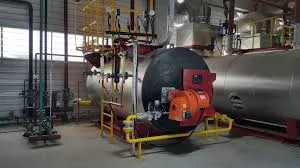
Dec . 07, 2024 12:15 Back to list
hot water boiler capacity calculation
Calculating Hot Water Boiler Capacity A Comprehensive Guide
The capacity of a hot water boiler is a critical factor in ensuring efficient heating for residential and commercial spaces. It directly impacts the performance and reliability of the heating system, making it essential to calculate the right capacity accurately. This article explores the methodologies for calculating hot water boiler capacity, factors to consider, and the importance of proper sizing.
Understanding Boiler Capacity
Boiler capacity is typically measured in British Thermal Units (BTUs) per hour, demonstrating the amount of heat energy the boiler can generate. For hot water applications, this measurement is crucial for meeting the heating demands of the intended space. If the boiler is undersized, it may struggle to provide adequate heat during peak demand, resulting in discomfort. Conversely, an oversized boiler can lead to frequent cycling, inefficiency, and higher operational costs.
Key Factors in Capacity Calculation
1. Heat Loss One of the first steps in calculating boiler capacity is determining the heat loss of the building. Heat loss calculations take into account various factors such as insulation levels, window sizes, door openings, and the building's orientation. This information helps establish how much heat is required to maintain a comfortable indoor temperature.
2. Water Temperature The desired water temperature for your hot water system significantly influences the boiler’s capacity. For domestic hot water, a typical temperature range is between 120°F to 140°F (49°C to 60°C), while for space heating, it might be higher. Knowing the required temperature allows for accurate BTU calculations based on the volume of water that needs to be heated.
3. Flow Rate The flow rate of hot water needed is another critical factor. This is typically measured in gallons per minute (GPM). For instance, if the system needs to supply hot water to multiple fixtures simultaneously, the total flow rate must be calculated to ensure that the boiler can keep up with demand.
4. Usage Patterns Understanding how hot water will be used in the structure can influence capacity needs. For example, a commercial kitchen will have different demands compared to a residential bathroom. Assessing peak usage times can help in calculating the correct capacity.
5. Elevation and Climate Geographical factors, such as elevation and climate, also play a role in capacity calculation. Colder climates may require additional heating capacity to offset higher heat loss, especially during winter months.
hot water boiler capacity calculation

Capacity Calculation Methodology
Once the necessary factors have been determined, boiler capacity can be calculated using the following formula
\[ \text{BTU/hr} = \text{Flow Rate (GPM)} \times \text{Temperature Rise (°F)} \times 8.33 \]
Where
- Flow Rate (GPM) The amount of water needed per minute. - Temperature Rise (°F) The difference between the desired temperature and the incoming water temperature. - 8.33 The weight of one gallon of water in pounds.
For example, if a system requires 5 GPM of water and the temperature rise needed is 70°F, the capacity required would be
\[ \text{BTU/hr} = 5 \, \text{GPM} \times 70 \, °F \times 8.33 \approx 2,915 \, \text{BTU/hr} \]
Conclusion
Calculating the correct capacity for a hot water boiler is vital for ensuring efficient and effective heating. By considering all relevant factors, such as heat loss, temperature demands, and usage patterns, homeowners and facility managers can select a boiler that meets their specific heating requirements. An accurate calculation not only enhances comfort but also fosters energy efficiency, leading to reduced operational costs and a smaller environmental footprint. Therefore, taking the time to perform this essential calculation is a worthwhile investment for any heating system installation.
-
High-Efficiency Commercial Oil Fired Steam Boiler for Industry
NewsJul.30,2025
-
High-Efficiency Biomass Fired Thermal Oil Boiler Solutions
NewsJul.30,2025
-
High Efficiency Gas Fired Thermal Oil Boiler for Industrial Heating
NewsJul.29,2025
-
High-Efficiency Gas Fired Hot Water Boiler for Sale – Reliable & Affordable
NewsJul.29,2025
-
High Efficiency Biomass Fired Hot Water Boiler for Industrial and Commercial Use
NewsJul.29,2025
-
High-Efficiency Biomass Fired Hot Water Boiler for Industrial Use
NewsJul.28,2025
Related PRODUCTS






















